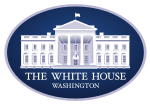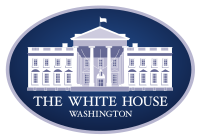What's next for the Trump White House staff?
![]() Ballotpedia's scope changes periodically, and this article type is no longer actively created or maintained. If you would like to help our coverage grow, consider donating to Ballotpedia.
Ballotpedia's scope changes periodically, and this article type is no longer actively created or maintained. If you would like to help our coverage grow, consider donating to Ballotpedia.
Trump Administration (first term) Vice President Mike Pence Cabinet • White House staff • Transition team • Trump's second term |
Domestic affairs: Abortion • Crime and justice • Education • Energy and the environment • Federal courts • Firearms policy • First Amendment • Healthcare • Immigration • Infrastructure • LGBTQ issues • Marijuana • Puerto Rico • Social welfare programs • Veterans • Voting issues Economic affairs and regulations: Agriculture and food policy • Budget • Financial regulation • Jobs • Social Security • Taxes • Trade Foreign affairs and national security: Afghanistan • Arab states of the Persian Gulf • China • Cuba • Iran • Iran nuclear deal • Islamic State and terrorism • Israel and Palestine • Latin America • Military • NATO • North Korea • Puerto Rico • Russia • Syria • Syrian refugees • Technology, privacy, and cybersecurity |
| Polling indexes: Opinion polling during the Trump administration |
![]() This article covering the 2016 presidential election was written outside the scope of Ballotpedia's encyclopedic coverage and does not fall under our neutrality policy or style guidelines. It is preserved as it was originally written. For our encyclopedic coverage of the 2016 election, click here.
This article covering the 2016 presidential election was written outside the scope of Ballotpedia's encyclopedic coverage and does not fall under our neutrality policy or style guidelines. It is preserved as it was originally written. For our encyclopedic coverage of the 2016 election, click here.
November 22, 2016
By James A. Barnes
More than a week after President-elect Donald Trump named Republican National Committee Chairman Reince Priebus to be his White House chief of staff and Stephen K. Bannon, his campaign CEO, to be chief strategist and senior counselor, the top staff offices in Trump’s West Wing—other than that of the national security adviser—were still officially empty.
The two appointments were jointly announced in a Trump transition press release that declared, “Bannon and Priebus will continue the effective leadership team they formed during the campaign, working as equal partners to transform the federal government, making it much more efficient, effective and productive.”
Some Washington observers pointedly noted that Bannon received top billing in the transition press release and would not have to report through Priebus to get to Trump. Typically, White House aides, even senior advisers with the title “Assistant to the President,” report to the president’s chief of staff. But it shouldn’t be surprising that the most unconventional presidential candidate in recent history would opt for a different organizational model. And the prospect that his son-in-law, Jared Kushner, a close confidant, might play an advisory role in the White House could create unclear lines of authority in the West Wing, or worse, competing power centers.
Kushner’s potential influence and future role as a presidential adviser was on display on Monday when he attended a meeting between Trump and television network anchors and executives along with Bannon and Priebus.
It’s hard to predict how the White House staff will come together under the next president, but one model could resemble “the troika” that Ronald Reagan installed during his first term in office. In 1981, the Reagan White House was run by a “big three”: Edwin Meese, counselor to the president; James A. Baker III, his chief of staff; and Michael K. Deaver, the deputy chief of staff. Meese—who had been an aide to Reagan when he was governor of California, rising to the post of chief of staff in Sacramento—was ostensibly in charge of policy development for the new president. Baker was in charge of the operational side of the White House, communications, legislative affairs, the personnel office, the paper flow into the Oval Office, intergovernmental affairs, and other West Wing functions. Deaver, who also served Reagan for eight years when he was California’s governor, was the “keeper of the body,” in charge of presidential travel arrangements, White House stagecraft, and—perhaps most importantly—chief conduit to first lady Nancy Reagan, the president’s closest confidant.
While the “troika” was presented as a team, Meese was initially seen as the first among equals. Reporters dubbed him Reagan’s “prime minister” and “Reagan’s conceptualizer,” and unlike Baker and Deaver, Meese was given Cabinet rank. Still, Meese was reportedly put off that he wasn’t tapped to be White House COS, according to Washington Post White House correspondent Lou Cannon, whose biography, President Reagan: The Role of a Lifetime, is widely considered one of the best books on the Reagan presidency. And as Meese recalled in his autobiography, With Reagan: The Inside Story, he hammered out “an understanding, in writing,” with Baker over who would handle which portfolios in the West Wing.
In a way, Priebus’ appointment as Trump’s White House chief of staff resembles Reagan’s selection of Baker, who had known the incoming president for only about six months “and did not know him well,” according to Cannon. But if Priebus is able to match Baker’s tenure in the White House, the Trump administration will be well served.
Priebus’ ties to Trump—and importantly, his family—were nurtured over the course of the 2016 election, primarily after Trump became the de facto GOP nominee in early May. That relationship, like many forged during a campaign, was not without some bumps along the way. Priebus was reportedly frustrated by Trump’s public feud with the Khan family, parents of a Muslim solider who had been killed in combat in Iraq, as well as his nominee’s harsh rhetoric on immigration and funding the campaign.
Baker had actually worked against Reagan in two elections and had relatively little experience in Washington, D.C., prior to his tour as Reagan’s first White House chief of staff. President Ford nominated Baker to be under secretary of commerce in the summer of 1975, and he served there for only nine months, although three of those were as acting secretary of the department. In the spring of 1976, at the behest of then-White House chief of staff Dick Cheney, President Gerald R. Ford brought Baker on board his presidential campaign as deputy chairman for delegate operations. Baker guided Ford to a tight victory over Reagan in the last GOP contested convention. After that, Baker became Ford’s national campaign chairman, the third in five months. Ford waged a valiant general election campaign but came up short, and Baker returned to Texas and ran for attorney general in 1978, a race he lost.
Baker then managed George H.W. Bush’s unsuccessful bid to become the 1980 GOP presidential nominee against Ronald Reagan. Bush lost the nomination, but became the 1980 standard bearer’s running mate. Baker didn’t have a principal role in the general election campaign of the soon-to-be 40th president, but the Texan oversaw general election debate negotiations and debate prep for Reagan, and in doing so he impressed both of the Reagans. After Reagan won, he named Baker chief of staff, with Nancy Reagan’s support, which angered some conservatives who noted that Baker had opposed Reagan’s election—twice—and surprised others who assumed Meese’s longtime loyalty would be awarded.
But as Reagan biographer Cannon keenly observed, the incoming president had a history of selecting “people for what he thought they could do for him rather than for what they had done for others.” Cannon wrote that Reagan’s appointment of a pragmatist like Baker was seen by some as a sign of his “willingness to listen to conventional political wisdom.” Cannon also noted that Baker’s organizational talent—a weakness Reagan perceived in Meese—was the central reason for his selection as chief of staff.
After Priebus’ appointment was announced, RNC chief strategist and communications director Sean Spicer told a Washington audience that his boss was “a consensus builder and someone who takes a vision and gets it done.”
Ultimately, Baker emerged as the most important player in the Reagan West Wing for executing his president’s agenda. In part, that was due to the fact that the operational units in the White House reported to Baker.
While Trump’s Cabinet nominations are garnering most of the media attention so far during the transition, it’s the dozens of top White House jobs that are going to have a huge impact on the fate of Trump’s presidency. For instance, the person who is tapped to be Trump’s assistant to the president for legislative affairs is going to play a key role in helping to pass the new president’s agenda on Capitol Hill. Likewise, whomever that person reports to (presumably, the chief of staff) is going to give us some clues to how the Trump White House is going to function.
James A. Barnes is a senior writer for Ballotpedia and co-author of the 2016 edition of the Almanac of American Politics.
See also
| |||||||||||||||||||



